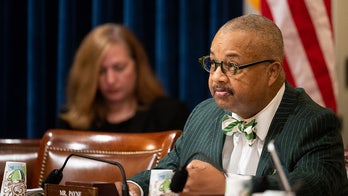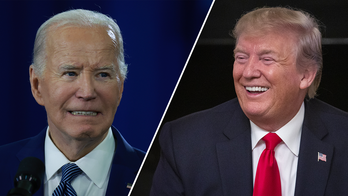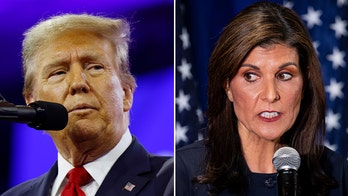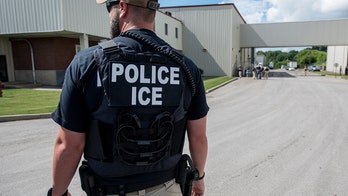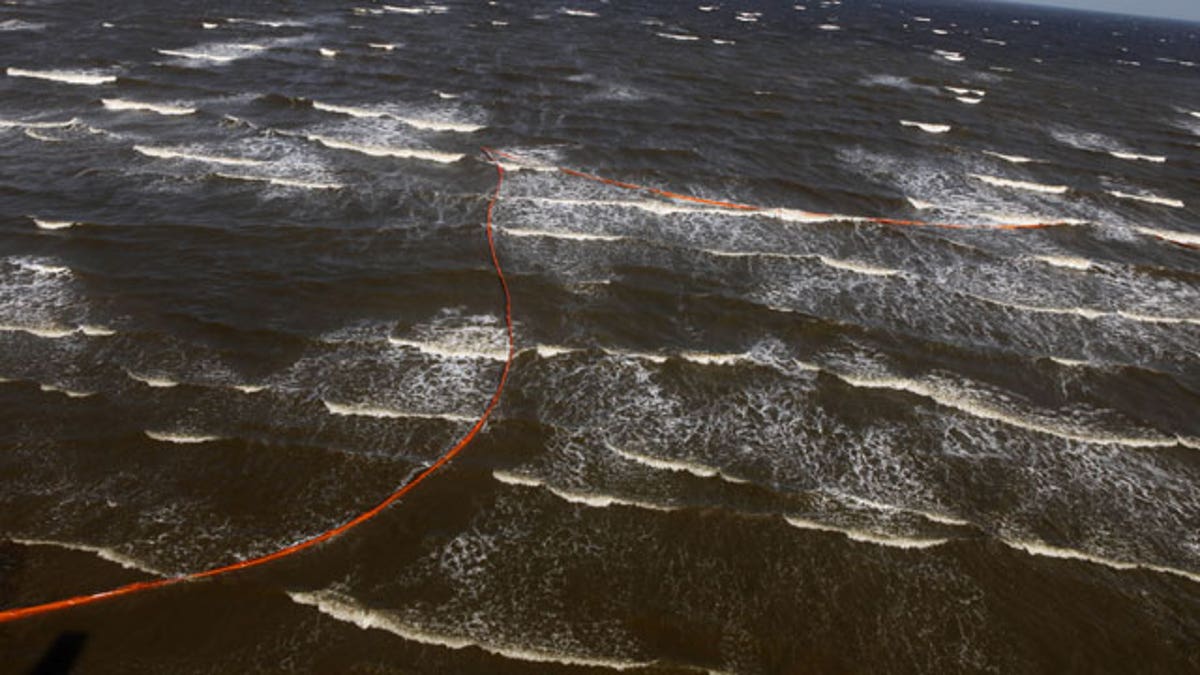
April 29: Oil booms that were placed in preparation of the looming oil spill from last week's collapse and spill of the Deepwater Horizon oil rig are seen strewn along the shoreline from choppy seas in Port Eads, La. (AP)
WASHINGTON -- President Obama expressed support Friday for new offshore drilling despite suspending all plans for drilling expansion until authorities learn what caused the explosion of the rig Deepwater Horizon in the Gulf of Mexico.
"I continue to believe that domestic oil production is an important part of our overall strategy for energy security," Obama said in remarks in the White House Rose Garden. "But I've always said it must be done responsibly for the safety of our workers and our environment."
Obama said he has ordered Interior Secretary Ken Salazar to review what happened and report within 30 days. That review will examine what safeguards there should be to prevent future spills.Obama said any new oil drilling leases must have safeguards against accidents.
Earlier, the White House announced its suspension of new drilling, the morning after oil started washing up on the Mississippi shoreline.
"No additional drilling has been authorized and none will until we find out what happened here and whether there was something unique and preventable here," White House adviser David Axelrod said on ABC's "Good Morning America" show. "No domestic drilling in new areas is going to go forward until there is a adequate review of what's happened here and of what is being proposed elsewhere."
BP, which operates the oil rig, has asked the federal government for help containing the spill, which is now at 5,000 barrels a day. The Navy has deployed salvage teams, skimmers and about 50 contractors to operate the skimmers but more assistance is expected.
Obama said BP is "ultimately responsible under the law paying the cost" for the cleanup operation. But he added, "We are fully prepared to meet our responsibilities to any and all affected communities."
BP said Friday it is trying to stem the flow of oil from the sub-sea well, to contain the spill offshore and to protect the Gulf coast.
"We are doing absolutely everything in our power to eliminate the source of the leak and contain the environmental impact of the spill. We are determined to fight this spill on all fronts, in the deep waters of the Gulf, in the shallow waters and, should it be necessary, on the shore," said BP Group Chief Executive Tony Hayward.
Obama had been under pressure from Democratic senators to halt any plans. Sen. Bill Nelson, D-Fla., said Thursday he was introducing legislation to block Obama's plan until the completion of federal investigations into the Deepwater Horizon oil rig explosion that presumably killed 11 workers and critically injured three on April 20.
As Obama puts a hold on drilling, Axelrod deflected comparisons with the Bush administration's response to Hurricane Katrina in 2005, saying such speculation "is always the case in Washington whenever something like this happens."
White House spokesman Nick Shapiro also issued a statement Friday noting the list of actions taken by the administration, including activating the National Response Team, composed of 16 federal departments and agencies responsible for emergency preparedness and responding to oil and hazardous substance pollution incidents.
"The president has been in contact with all the governors of the states that may be affected and ordered that the administration use every single available resource at our disposal, including potentially the Department of Defense," Shapiro said.
White House Press Secretary Robert Gibbs said Thursday that Obama is concerned how any future decision to expand drilling is affected by the accident, and his view of offshore drilling could change once the cause is determined.
"Today, we don't know what the cause is," Gibbs said. "If we're saying that (U.S. officials) came to the president and said, here's what caused it, would, that could that possibly change his viewpoint? Well, of course."
Last month, Obama proposed new offshore drilling in the Atlantic Ocean from Delaware to central Florida, plus the northern waters of Alaska. Obama also wanted Congress to lift a drilling ban in the oil-rich eastern Gulf of Mexico, 125 miles from Florida beaches. Drilling already takes place in western and central areas of the Gulf of Mexico.
The plan was aimed at balancing the concerns of environmentalists and finding ways to reduce U.S. reliance on foreign oil and create jobs. White House officials also hoped that the plan, which would reverse a long-standing ban on most offshore drilling, would secure support for a climate change bill that is languishing in Congress.
"The bottom line is this -- given our energy needs, in order to sustain economic growth, and produce jobs, and keep our businesses competitive, we are going to need to harness traditional sources of fuel even as we ramp up production of new sources of renewable, homegrown energy," Obama said at the time of his announcement.
At the time, proponents of offshore drilling said the ruling didn't go far enough. Now, at least three key senators opposed to expanded offshore drilling -- Nelson along with Robert Menendez and Frank Lautenberg of New Jersey -- now are calling on Obama to drop the plan.
"Big Oil has perpetuated a dangerous myth that coastline drilling is a completely safe endeavor, but accidents like this are a sober reminder just how far that is from the truth," Menendez and Lautenberg said in a written statement.
Nelson cautioned that plans for more offshore drilling could set the stage for similar disasters.
"The tragedy off the coast of Louisiana shows we need to be asking a lot more tough questions of Big Oil," said Nelson, a key player in recent years in the national debate over offshore oil drilling.
The cost of the spill continues to rise and could easily top $1 billion.
Nelson said he wants the Interior Department to provide a comprehensive report on all U.S. drilling accidents over at least the last decade.
"I think we need to look back over 10 years or so to see if the record denies the industry's claims about safety and technology," he said.
Lautenberg and Menendez, who have long opposed offshore drilling, said 509 oil rig fires have broken out in the Gulf of Mexico since 2006.
While oil rig fires are rare, there were at least three in the Gulf this year before last week's incident and 14 last year, according to The Wall Street Journal.
Just last week, Gibbs said the oil rig explosion was no reason to give up the offshore drilling plans.
At the time, Gibbs said that Obama continues to believe that the United States needs a comprehensive solution to its energy problems -- including expanding domestic production of oil and natural gas.
Obama believes most energy production can be done safely and without harming the environment, Gibbs said, but he conceded there will sometimes be accidents.
"In all honesty I doubt this is the first accident that has happened and I doubt it will be the last," Gibbs told reporters.
On Tuesday, Rep. Henry Waxman, D-Calif., chairman of the House Energy and Commerce Committee, and Rep. Bart Stupak, D-Mich., chairman of the committee's investigations subcommittee, requested BP provide documents as part of a congressional investigation into the accident. The congressmen sent letters to Transocean Ltd., the rig's owner, and to BP PLC, which operates the rig.
Waxman and Stupak want company documents on the risk of an accident, potential responses and contingency plans, among other things.

